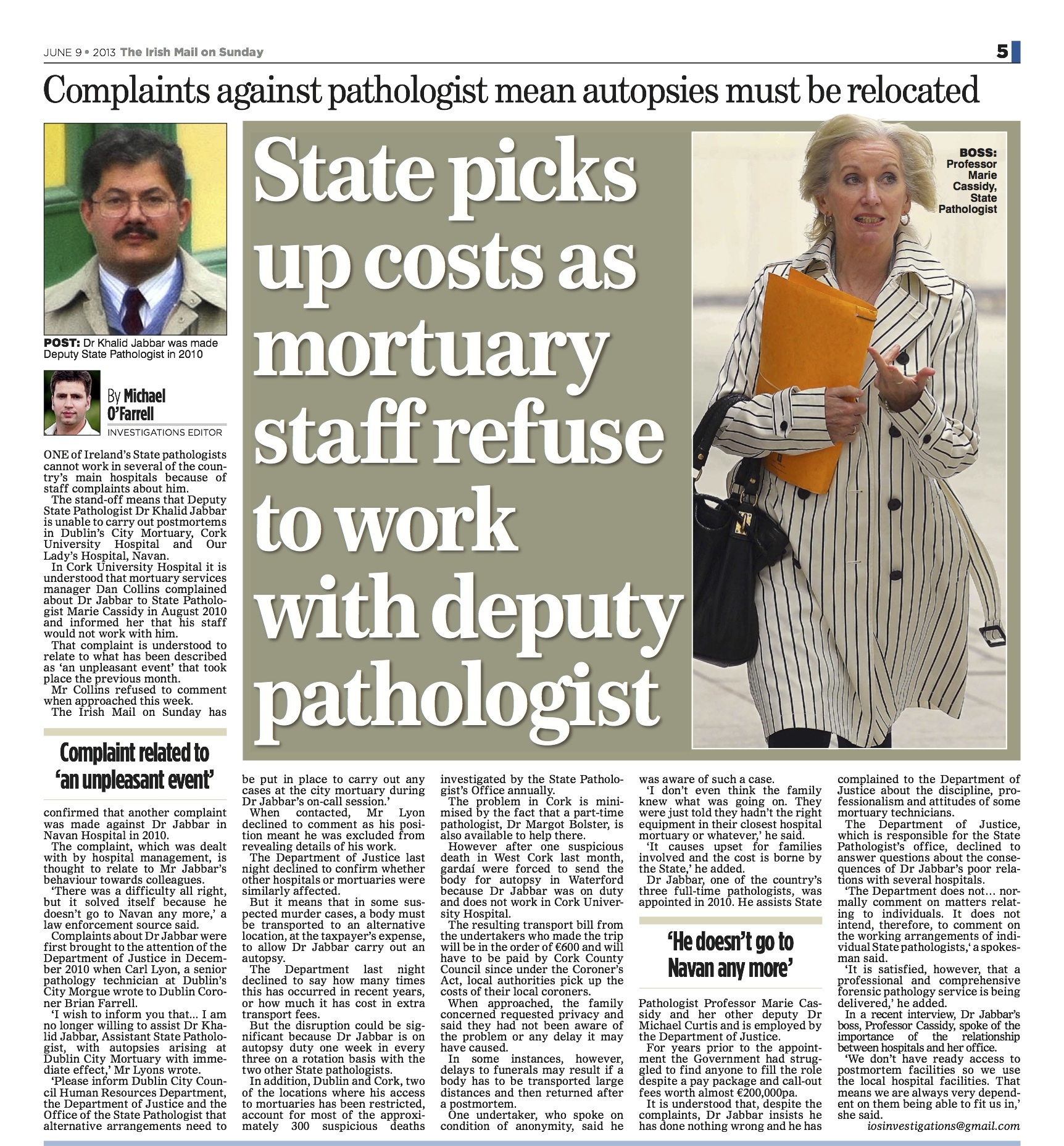By: Michael O’Farrell
Investigations Editor
ONE of Ireland’s State pathologists cannot work in several of the country’s main hospitals because of staff complaints about him.
The stand-off means that Deputy State Pathologist Dr Khalid Jabbar is unable to carry out postmortems in Dublin’s City Mortuary, Cork University Hospital and Our Lady’s Hospital, Navan.
In Cork University Hospital it is understood that mortuary services manager Dan Collins complained about Dr Jabbar to State Pathologist Marie Cassidy in August 2010 and informed her that his staff would not work with him.
That complaint is understood to relate to what has been described as ‘an unpleasant event’ that took place the previous month.
Mr Collins refused to comment when approached this week.
The Irish Mail on Sunday has confirmed that another complaint was made against Dr Jabbar in Navan Hospital in 2010.
The complaint, which was dealt with by hospital management, is thought to relate to Mr Jabbar’s behaviour towards colleagues.
‘There was a difficulty all right, but it solved itself because he doesn’t go to Navan any more,’ a law enforcement source said.

Complaints about Dr Jabbar were first brought to the attention of the Department of Justice in December 2010 when Carl Lyon, a senior pathology technician at Dublin’s City Morgue wrote to Dublin Coroner Brian Farrell.
‘I wish to inform you that… I am no longer willing to assist Dr Khalid Jabbar, Assistant State Pathologist, with autopsies arising at Dublin City Mortuary with immediate effect,’ Mr Lyons wrote. ‘Please inform Dublin City Council Human Resources Department, the Department of Justice and the Office of the State Pathologist that alternative arrangements need to be put in place to carry out any cases at the city mortuary during Dr Jabbar’s on-call session.’
When contacted, Mr Lyon declined to comment as his position meant he was excluded from revealing details of his work.
The Department of Justice last night declined to confirm whether other hospitals or mortuaries were similarly affected.
But it means that in some suspected murder cases, a body must be transported to an alternative location, at the taxpayer’s expense, to allow Dr Jabbar carry out an autopsy.
The Department last night declined to say how many times this has occurred in recent years, or how much it has cost in extra transport fees.
But the disruption could be significant because Dr Jabbar is on autopsy duty one week in every three on a rotation basis with the two other State pathologists.
In addition, Dublin and Cork, two of the locations where his access to mortuaries has been restricted, account for most of the approximately 300 suspicious deaths investigated by the State Pathologist’s Office annually.
The problem in Cork is minimised by the fact that a part-time pathologist, Dr Margot Bolster, is also available to help there.
However after one suspicious death in West Cork last month, gardaí were forced to send the body for autopsy in Waterford because Dr Jabbar was on duty and does not work in Cork University Hospital.
The resulting transport bill from the undertakers who made the trip will be in the order of €600 and will have to be paid by Cork County Council since under the Coroner’s Act, local authorities pick up the costs of their local coroners.
When approached, the family concerned requested privacy and said they had not been aware of the problem or any delay it may have caused.
In some instances, however, delays to funerals may result if a body has to be transported large distances and then returned after a postmortem.
One undertaker, who spoke on condition of anonymity, said he was aware of such a case.
‘I don’t even think the family knew what was going on. They were just told they hadn’t the right equipment in their closest hospital mortuary or whatever,’ he said.
‘It causes upset for families involved and the cost is borne by the State,’ he added.
Dr Jabbar, one of the country’s three full-time pathologists, was appointed in 2010. He assists State Pathologist Professor Marie Cassidy and her other deputy Dr MichaelCurtis and is employed by the Department of Justice.
For years prior to the appointment the Government had struggled to find anyone to fill the role despite a pay package and call-out fees worth almost €200,000pa.
It is understood that, despite the complaints, Dr Jabbar insists he has done nothing wrong and he has complained to the Department of Justice about the discipline, professionalism and attitudes of some mortuary technicians.
The Department of Justice, which is responsible for the State Pathologist’s office, declined to answer questions about the consequences of Dr Jabbar’s poor relations with several hospitals. ‘The Department does not… normally comment on matters relating to individuals. It does not intend, therefore, to comment on the working arrangements of individual State pathologists,’ a spokesman said.
‘It is satisfied, however, that a professional and comprehensive forensic pathology service is being delivered,’ he added.
In a recent interview, Dr Jabbar’s boss, Professor Cassidy, spoke of the importance of the relationship between hospitals and her office.
‘We don’t have ready access to postmortem facilities so we use the local hospital facilities. That means we are always very dependent on them being able to fit us in,’ she said.
